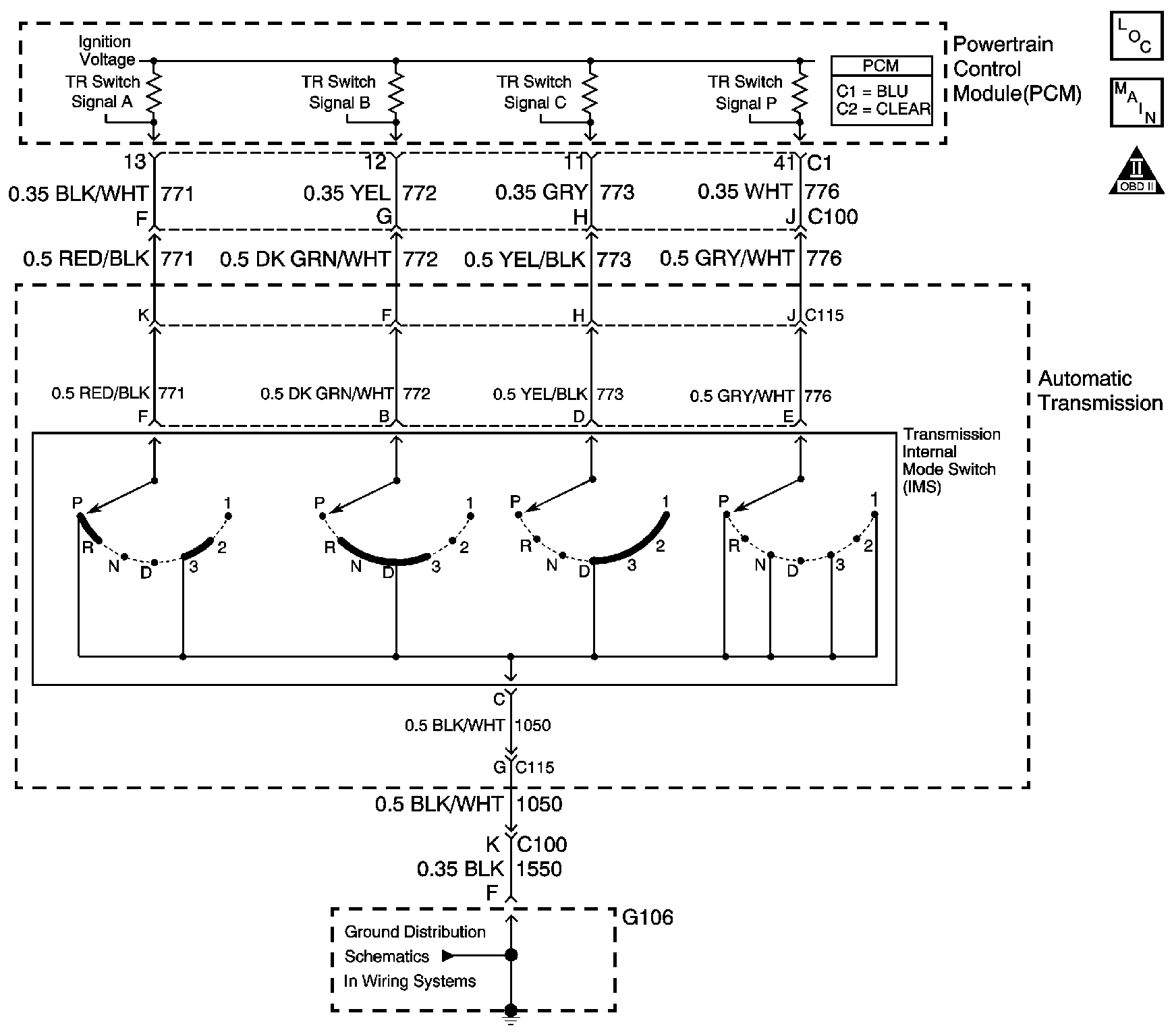
Circuit Description
The transmission internal mode switch (IMS) is a sliding contact switch attached to the lower control valve body, within the transmission. The manual valve link assembly then connects the IMS to the manual valve. The four inputs to the PCM from the IMS indicate which position is selected by the transmission selector lever. This information is used for engine controls as well as determining the transmission shift patterns. The input voltage level at the PCM is high, ignition voltage, when the IMS is open and low when the switch is closed to ground. The state of each input is available for display on the scan tool. The four input parameters represented are Signal A, Signal B, Signal C and Signal P, Parity.
If the PCM detects an IMS transitional state between D2 and D1 while the vehicle is in motion, then DTC P1822 sets. DTC P1822 is a type B DTC.
Conditions for Running the DTC
| • | The system voltage is 8-18 volts. |
| • | The engine run time is greater than 5 seconds. |
| • | The engine torque is 40-200 N·m (30-148 lb ft). |
Conditions for Setting the DTC
| • | The IMS indicates PARK for 2 seconds, then; |
| • | The IMS indicates a transitional state between D2 and D1 for 5 seconds. |
Action Taken When the DTC Sets
| • | The PCM illuminates the malfunction indicator lamp (MIL) during the second consecutive trip in which the Conditions for Setting the DTC are met. |
| • | The PCM commands maximum line pressure. |
| • | The PCM assumes a D4 shift pattern. |
| • | The PCM freezes transmission adapt functions. |
| • | The PCM records the operating conditions when the Conditions for Setting the DTC are met. The PCM stores this information as Freeze Frame and Failure Records. |
| • | The PCM stores DTC P1822 in PCM history during the second consecutive trip in which the Conditions for Setting the DTC are met. |
Conditions for Clearing the MIL/DTC
| • | The PCM turns OFF the MIL during the third consecutive trip in which the diagnostic test runs and passes. |
| • | A scan tool can clear the MIL/DTC. |
| • | The PCM clears the DTC from PCM history if the vehicle completes 40 warm-up cycles without an emission-related diagnostic fault occurring. |
| • | The PCM cancels the DTC default actions when the ignition switch is OFF long enough in order to power down the PCM. |
Test Description
The numbers below refer to the step numbers on the diagnostic table.
-
This step determines if the fault is internal or external to the transmission.
-
This step determines if the engine wiring harness circuit is at fault or the PCM.
-
This step determines if the automatic transmission wiring harness is at fault or the IMS.
Step | Action | Value(s) | Yes | No | ||||||||
|---|---|---|---|---|---|---|---|---|---|---|---|---|
1 | Did you perform the Powertrain Diagnostic System Check? | -- | Go to Step 2 | Go to Diagnostic System Check - Engine Controls in Engine Controls | ||||||||
2 |
Important: Before clearing the DTC, use the scan tool in order to record the Freeze Frame and Failure Records. Using the Clear Info function erases the Freeze Frame and Failure Records from the PCM. Does the scan tool IMS display Drive 4? | -- | Go to Intermittent Conditions in Engine Controls | Go to Step 3 | ||||||||
Refer to Automatic Transmission Inline Harness Connector End View . Is signal B LOW? | -- | Go to Step 5 | Go to Step 4 | |||||||||
Test the signal B circuit (CKT 772) of the IMS for an open between the PCM connector C1 and the AT inline 20-way connector. Refer to Circuit Testing and Wiring Repairs in Wiring Systems. Did you find and correct the condition? | -- | Go to Step 9 | Go to Step 8 | |||||||||
Test the signal B circuit (CKT 772) of the IMS for an open between the AT inline 20-way connector and the IMS. Refer to Circuit Testing in Wiring Systems. Did you find the condition? | -- | Go to Step 6 | Go to Step 7 | |||||||||
6 |
Important: The automatic transmission wiring harness consists of two separate harnesses, the Automatic Transmission Wiring Harness Assembly, GM P/N 15320475, and the Automatic Transmission Wiring Extension Harness Assembly, GM P/N 15320478. In order to avoid the unnecessary replacement of parts, determine which harness contains the fault and replace only that harness. Replace the automatic transmission wiring harness. Refer to Input Speed Sensor and Wiring Harness Removal in the 4T80-E section of the Transmission Unit Repair Manual. Did you complete the replacement? | -- | Go to Step 9 | -- | ||||||||
7 | Replace the transmission internal mode switch. Refer to Lower Control Valve Body Assembly Removal in the 4T80-E section of the Transmission Unit Repair Manual. Did you complete the replacement? | -- | Go to Step 9 | -- | ||||||||
8 | Replace the PCM. Refer to Powertrain Control Module Replacement in Engine Controls. Did you complete the replacement? | -- | Go to Step 9 | -- | ||||||||
9 | Perform the following procedure in order to verify the repair:
Has the test run and passed? | -- | System OK | Go to Step 1 |
